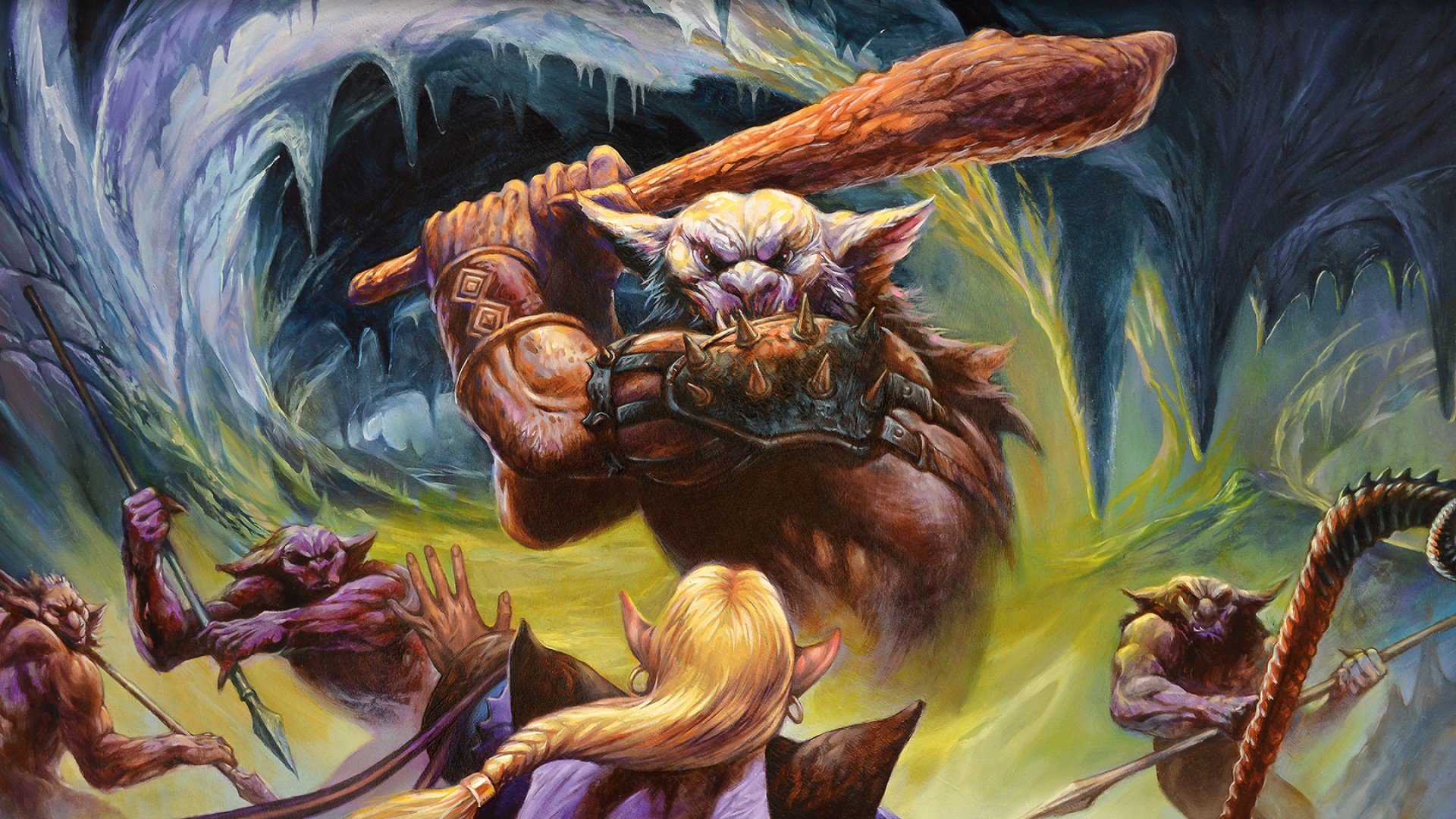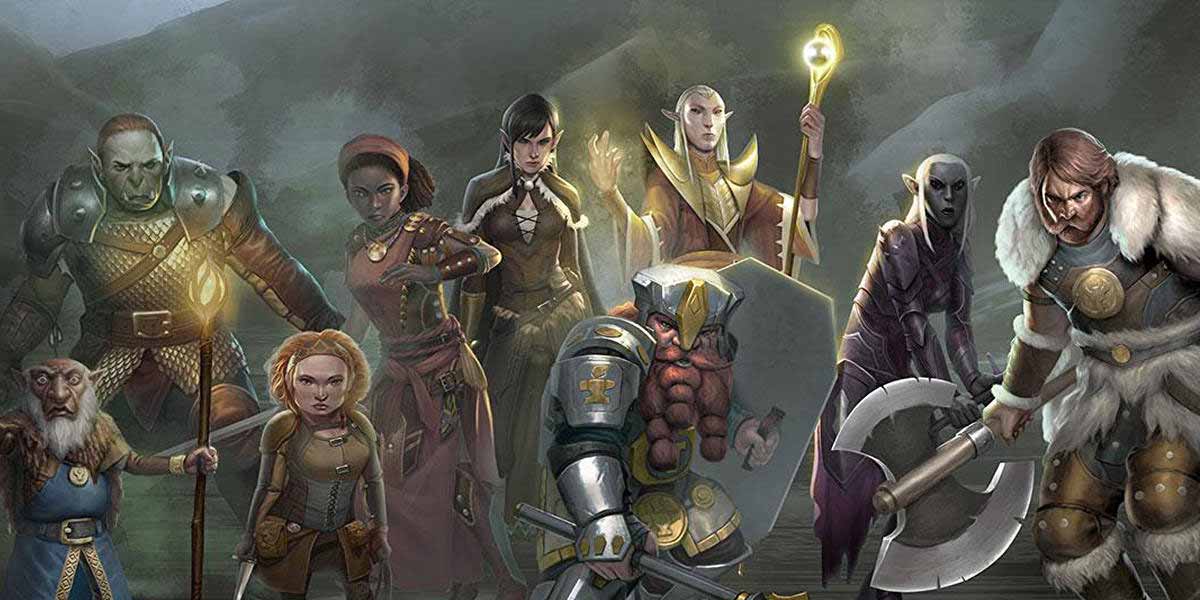Languages dnd – Welcome to the realm of languages in Dungeons & Dragons, where words hold power and communication is key. In this comprehensive guide, we will delve into the diverse array of languages that shape the world of D&D, from common tongues to ancient scripts.
From deciphering ancient texts to casting powerful spells, languages play a vital role in D&D. Whether you’re a seasoned adventurer or a curious newcomer, this guide will equip you with the knowledge and skills to master the art of linguistic communication in the realm of Dungeons & Dragons.
Languages in Dungeons & Dragons
In the realm of Dungeons & Dragons, the ability to communicate is paramount. Languages play a vital role in facilitating interactions between characters, enabling them to converse, exchange knowledge, and unravel ancient secrets. Within this vast and diverse fantasy world, a plethora of languages exists, each with its own unique characteristics and significance.
The languages of D&D can be broadly categorized into three groups: common, uncommon, and rare. Common languages are widely spoken and understood across the land, enabling communication between characters of diverse backgrounds. Uncommon languages are known to a smaller group of individuals, often associated with specific regions, cultures, or professions.
Rare languages are the most obscure and difficult to learn, typically known only to a select few or found in ancient texts.
Spoken Languages
Spoken languages are the most prevalent form of communication in D&D. They allow characters to engage in verbal interactions, exchange information, and build relationships. Common spoken languages include Common, Dwarvish, Elvish, and Halfling, each with its own distinct vocabulary and grammar.
Written Languages
Written languages serve as a means of recording and preserving information. Characters can use written languages to create books, scrolls, and other documents, enabling them to convey messages across time and distance. Common written languages include Common, Dwarvish, Elvish, and Infernal, each with its own unique script and set of characters.
Magical Languages
Magical languages are imbued with arcane power, allowing characters to cast spells and manipulate the fabric of reality. These languages are typically known only to spellcasters and other individuals with a connection to the arcane arts. Common magical languages include Draconic, Celestial, and Abyssal, each with its own unique incantations and pronunciations.
Usage of Languages in D&D
Languages play a multifaceted role in D&D, serving a variety of purposes:
- Communication:Languages allow characters to interact with each other, exchange information, and build relationships.
- Spellcasting:Magical languages are essential for casting spells, as they provide the incantations and pronunciations necessary to harness arcane power.
- Deciphering Ancient Texts:Many ancient texts and artifacts contain valuable information written in obscure or forgotten languages. Characters with proficiency in these languages can decipher these texts, unlocking hidden knowledge and secrets.
Creating Custom Languages

Creating custom languages for Dungeons & Dragons can add depth and immersion to your campaign. Here’s a guide to help you design your own:
Grammar and Vocabulary
Determine the language’s grammar, including sentence structure, verb conjugation, and noun declensions. Create a vocabulary list that includes words for common objects, actions, and concepts. Consider the language’s history and cultural influences when developing its vocabulary.
Writing System
Design a writing system for your language. This could be an alphabet, syllabary, or logographic system. Consider the language’s origins and the materials available for writing in your campaign setting.
Example Custom Languages, Languages dnd
Here are some examples of custom languages created by other players and DMs:*
-*Draconic
A guttural language spoken by dragons, featuring a complex grammar and a vocabulary rich in descriptions of treasure and power.
-
-*Elvish
A melodic and flowing language spoken by elves, characterized by its use of metaphors and its focus on nature and the arts.
-*Orcish
A harsh and guttural language spoken by orcs, featuring a simple grammar and a vocabulary focused on warfare and violence.
Language-Based Character Options
Characters who specialize in languages gain access to a wide range of options that enhance their role-playing and problem-solving abilities. These options include:
Character Classes
- Bard:Bards are masters of language, able to use their words to inspire, deceive, or control others.
- Rogue:Rogues often rely on languages to gather information, forge documents, and communicate with informants.
- Wizard:Wizards can use languages to decipher ancient texts, cast spells with verbal components, and communicate with extraplanar beings.
Backgrounds
- Cloistered Scholar:Scholars have access to a wide range of languages, making them valuable researchers and translators.
- Criminal:Criminals often learn languages to communicate with informants, fences, and other underworld figures.
- Diplomat:Diplomats must be fluent in multiple languages to negotiate with foreign dignitaries and resolve conflicts.
Feats
- Linguist:This feat grants proficiency in three additional languages.
- Observant:This feat grants proficiency in the Perception skill, which can be used to notice subtle cues in speech and body language.
- Skilled:This feat grants proficiency in three additional skills, which can include languages.
Language-Based Encounters

Incorporating language-based encounters into D&D campaigns can add depth and variety, challenging players’ skills and encouraging creative problem-solving.
These encounters can take various forms, such as deciphering coded messages, translating ancient inscriptions, or communicating with non-humanoid creatures.
Designing Language-Based Encounters
When designing language-based encounters, consider the following:
- Difficulty:Tailor the complexity of the language challenge to the players’ proficiency levels.
- Relevance:Connect the encounter to the campaign’s narrative or player characters’ backgrounds.
- Clues and Hints:Provide players with clues or hints to help them solve the language puzzle.
- Time Constraints:Introduce time constraints to add urgency and increase the stakes.
Example Encounters
Here are a few examples of language-based encounters:
- Deciphering a Coded Message:Players encounter a scroll or letter written in an unknown code. They must use their language skills to decipher the message, which could contain vital information for the campaign.
- Translating an Ancient Inscription:The party discovers an ancient artifact with an inscription in a forgotten language. Players must find a way to translate the inscription, which may reveal a hidden treasure or unlock a powerful secret.
- Communicating with a Non-Humanoid Creature:Players encounter a creature that speaks a language unknown to them. They must learn the creature’s language or find an intermediary to facilitate communication.
Wrap-Up: Languages Dnd

As we conclude our exploration of languages in Dungeons & Dragons, it becomes evident that the power of words extends far beyond mere communication. They are the tools that shape characters, enhance role-playing, and add depth to the D&D experience.
Whether you choose to create your own custom language, specialize in a language-based character, or encounter challenges that test your linguistic abilities, the realm of languages in D&D offers endless possibilities for creativity and adventure.
FAQ
What are the different types of languages in D&D?
There are three main types of languages in D&D: spoken, written, and magical. Spoken languages are used for everyday communication, while written languages are used for recording information and casting spells. Magical languages are used for casting spells and communicating with otherworldly beings.
How can I create my own custom language for D&D?
To create your own custom language, you will need to develop its grammar, vocabulary, and writing system. You can draw inspiration from existing languages or create something entirely new. Once you have created your language, you can use it in your D&D games to add depth and flavor to your campaign.
What are some examples of language-based character options in D&D?
There are several character classes, backgrounds, and feats that focus on languages in D&D. For example, the Linguist feat allows characters to learn additional languages, while the Prodigy background gives characters proficiency in two languages of their choice. Additionally, some classes, such as the Bard and the Wizard, have abilities that allow them to use languages for special purposes.